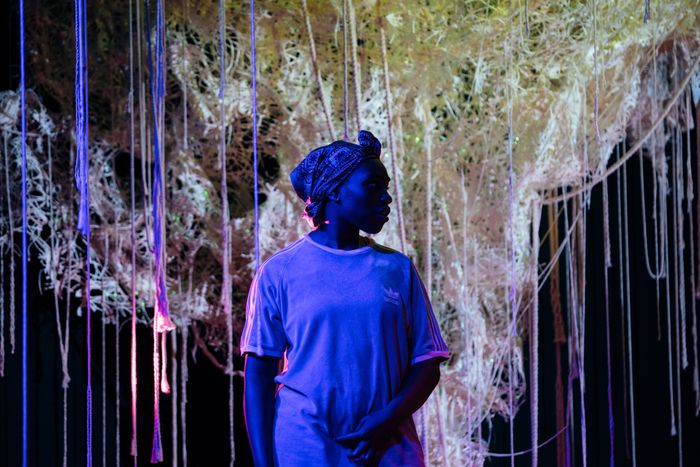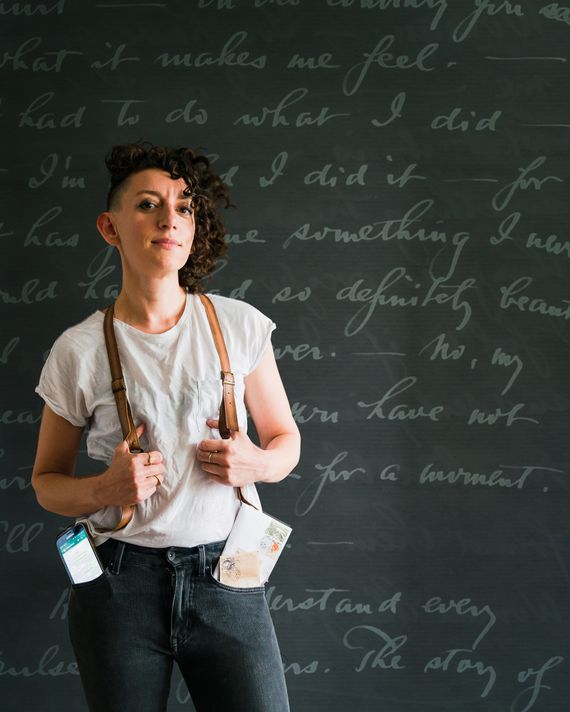
The internet holds such sway over the way we live, talk, and think, yet itÔÇÖs a fugitive thing to render onstage. Maybe you fill your set with screens to give the audience all the information you can, though that can distract from the actors. Or you go literal and have characters constantly holding and checking phones, which makes for static drama. The ingenious Seven Methods of Killing Kylie Jenner, a play awash with the language and mentality of the internet, instead weaves the internet into its set and its performances. Designer Rajha Shakiry has constructed a net of knotted white string that hangs over the action, tied around a trunklike construction at the back of the stage. It looks somewhere between a willow tree and an esophagus, and as the two friends at the center of the story descend into the madness of virality, it lights up like an alien maw sensing food.
Seven Methods, as Jasmine Lee-JonesÔÇÖs delightfully attention-grabbing title suggests, kicks off with some death threats directed at the young queen of the lip kit, though Kylie herself is only really a tertiary figure in the action. Cleo (Leanne Henlon), a young Black academic living in London, notices a tweet from Forbes reporting that Kylie has become the worldÔÇÖs youngest ÔÇ£self-madeÔÇØ billionaire (a report from 2019, later debunked), and starts to fire off a thread from her ÔÇ£incognegroÔÇØ Twitter account about making Kylie pay for appropriating the aesthetics of Black women. Cleo, whoÔÇÖs been on yet another break with a Black boyfriend whoÔÇÖs just started seeing a white woman, isnÔÇÖt in the best place emotionally, and so the thread is vivid and visceral (and the various manners of death quite gruesome) ÔÇö just the kind of thing that gets traction online. After CleoÔÇÖs tweets start getting picked up, her childhood friend Kara (Tia Bannon) shows up to check in with her. Kara, a more carefree queer stoner, tries to cool some of CleoÔÇÖs anger, whereupon Cleo lashes back from a place of righteous defensiveness. Bannon and Henlon immediately convince you of the reality of this friendship with an easy, inside-joke-filled intimacy. Then the play tests what happens when that friendship touches various third rails of internet discourse. Is KaraÔÇÖs view of the world sunnier because sheÔÇÖs light-skinned? Is Cleo a homophobe? Watch how the language of the internet nudges every conversation away from an exchange and toward a zero-sum game, with a winner and a loser, or a victim and a culprit.
Under Milli BhatiaÔÇÖs direction, Bannon and Henlon take it upon themselves to act out the language of the internet. That means, once each of CleoÔÇÖs tweets goes out, the two actors throw themselves into playing the variety of characters that make up the chorus of commenters, from gleeful rabble-rousers here for the mess to sanctimonious older posters concerned about kids these days to, inevitably, crazed white supremacists. The two actors also frequently act out memes, slamming a hand down to announce ÔÇ£not on my watch!ÔÇØ or stepping onto a platform to do the ÔÇ£why the fuck you lyingÔÇØ dance. If youÔÇÖve spent enough time online, itÔÇÖs striking how recognizable each pose is, even if youÔÇÖre seeing it performed with a body rather than pixels. ThereÔÇÖs an eerie sense throughout of the digital overriding the physical, which goes along with the feeling that Cleo and Kara are being puppeteered by conversations they thought they could control.
Seven Methods premiered at the Royal Court Theatre in 2019. Now, making it to New York as part of the Public TheaterÔÇÖs Under the Radar festival in January 2023, it feels like a document of a particular era. Sniff the memes on offer like a digital sommelier, and they really feel like they are from 2019, which is to say that they predate the fullness of TikTok ascendancy and are marked with a certain post-Brexit, Trump-era feeling that it might still be possible to right wrongs on Twitter, even if the conversation always curdles. ThatÔÇÖs not to say that the drama feels dated: ItÔÇÖs more Cassandra-like. In the isolating years since, it feels like weÔÇÖve just kept feeding that maw at the back of the stage, tying more and more of our self-worth to those strings hanging overhead. YouÔÇÖre not in danger of being caught; youÔÇÖre already being digested.
Rachel MarsÔÇÖs Your Sexts Are Shit: Older Better Letters, another work at Under the Radar about how electronic communication affects your psyche, is more erotic and also (starting with the title) more scatological.┬áIn her performance, Mars reads selections of horny missives from famous figures, like James Joyce (who had a real thing for farting and shitting, as you may not be surprised to discover), Mozart, Frida Kahlo, Gertrude Stein, and more, interspersed with a PowerPoint of decidedly less well-constructed sexts. At first, the point seems obvious: that weÔÇÖve lost something in going from pen and paper to Grindr and Gchat. I briefly wanted to stand up and defend what can be accomplished on an iPhone with deft thumbs and some imagination. But Mars, wisely, is also working that tack, and as she pulls up weirder old letters (even a quaint one from Marcel Proust) and folds in stories about literary sexual experiences of her own, the work becomes more tender and ambivalent. In MarsÔÇÖs telling, thereÔÇÖs something interesting going on in every attempt to pin down sexual desire in letters, even in the most shit of sexts, a common thread upon which we can all (sorry) come together.
Seven Methods of Killing Kylie Jenner is at the Public Theater until January 22.
Your Sexts Are Shit: Older Better Letters is at the Public Theater until January 15.



